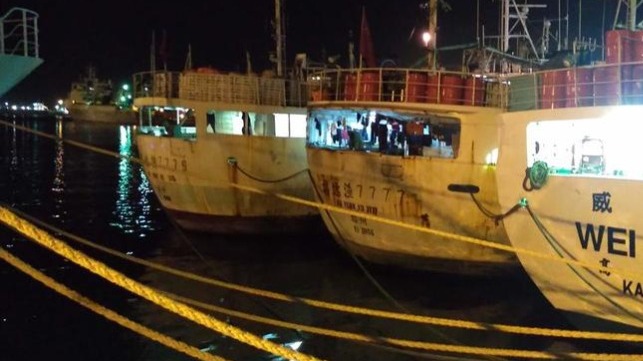Taiwan's Fishing Industry Faces New Pressure to Address Forced Labor

Greenpeace and 33 other NGOs and trade unions have joined together to call for Taiwan to take action on the use of forced labor in its distant-water fishing fleet. This year is the first that Taiwanese seafood products have been placed on the U.S. Department of Labor’s formal list of goods produced with forced labor, a designation that has put new pressure on the nation's billion-dollar fishing industry.
“Similar to crews on Chinese-flagged vessels, crews on Taiwan-flagged vessels face confiscation of documents, long days with little rest, physical and verbal abuse, and lack of payment," the U.S. Department of Labor concluded in its report.
Greenpeace's statement calls for Taiwan's government and its distant-water fishing industry to take action ensure Taiwan’s removal from the list.
“Greenpeace and other environmental and human rights NGOs’ investigations found that illegal, unreported, and unregulated (IUU) fishing is closely linked to forced labor at sea,” said Pearl Chen, oceans campaigner at Greenpeace East Asia’s Taipei office. “Forced labor and IUU have formed a vicious cycle because they are both driven by the desire to maximize profits. The government must pay attention to the rights of migrant fishers if we are to ever stop IUU fishing.”
The joint statement raised four main issues that the Taiwanese government should prioritize to end the mistreatment of migrant fishers aboard Taiwanese vessels:
- Taiwan's overseas employment scheme for migrant fishermen must be abolished, and the nation's Labor Standards Act must be applied equally to all.
- Wages must be paid in full, and there must be no illegal deductions. '
- Insurance compensation must be paid fully and swiftly to family members of crewmembers who die at sea.
- Establish a clear timeline for the implementation of the ILO Work in Fishing Convention.
- Increase the frequency and reliability of port inspections (both fishery and labor) for all vessels.
- Increase transparency in the fishery sector by requiring disclosure of vessel position (VMS or AIS) and punishing vessels for "going dark."
- Implement 100 percent observer coverage, either in-person or remote camera/sensor.
- Ensure the safety of all observers on all fishing vessels.

that matters most
Get the latest maritime news delivered to your inbox daily.
Greenpeace said that the U.S. Department of Labor welcomed the recommendations and said it would inform their work with Taiwan's government going forwards.
In a response, the head of Taiwan's Department of Labor Standards told Taipei Times that "the management of migrant fishers was the responsibility of the Fisheries Agency." The Fisheries Agency said that it is in discussions with industry and plans to increase inspections.
